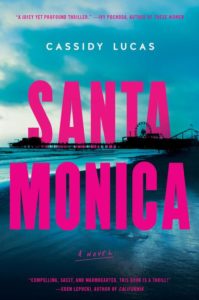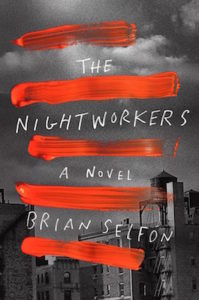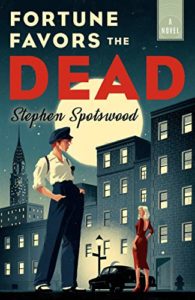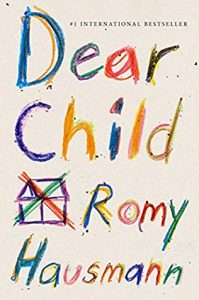Breaking into the crime game isn’t easy, but every month, a few brave and talented souls make a go of it. For readers, there are few experiences so thrilling as finding a new author whose career is just beginning and whose work promises years of enjoyment to come. But it’s sometimes hard to find those debuts. That’s where we come in. We’re scouring the shelves in search of auspicious debuts and recommending the very best for your reading pleasure.

Daniel Tunnard, Escapes (Unnamed Press)
In this wild, inventive debut, Tunnard imagines an alternate 1990s in Argentina where Scrabble is a national obsession and a trio of elderly women are financed by game endorsements and also running a mafia. Tunnard is himself a competitive Scrabble player and the details of that subculture have a ring of authenticity, even when they’re blown out on an epic, absurdist scale. His prose reads (purposefully) like a translation, and the effect is an uncanny, subtly exhilarating story about corruption and language. (Dwyer Murphy, CrimeReads Editor-in-Chief)

Cassidy Lucas, Santa Monica (Harper Perennial)
Rarely does a book grab me from its premise but this one did: handsome, elite trainer to the rich and fabulous women of Santa Monica found murdered on his gym floor. I would have written this more like a game of Clue—Mrs. Anderson did it in the locker room with a dumbbell!—but the duo of best friends Julia Fierro and Caeli Wolfson Widger have taken a more sophisticated approach, with the dark secrets of the sun-kissed ladies spilling out as the investigation proceeds. Santa Monica is Liane Moriarty in LA (as opposed Big Little Lies, which was filmed as Liane Moriarty in Monterey). Wherever you are it’s a good time. (Lisa Levy, CrimeReads contributing editor)

Brian Selfon, The Nightworkers (MCD)
Selfon’s impressive debut chronicles the life and times of a family business in Brooklyn. The business just so happens to be money laundering, with Shecky Keenan the anxious paterfamilias channeling the bounty of the city’s underworld through his sprawling network of high cash flow businesses. The intricacy of the operation is part of the story’s appeal, no doubt, but primarily this is a family portrait, with father, son, and daughter engaging in a battle of loyalty and creeping mistrust. Selfon is a major talent with a gift for illuminating an imagined underworld and populating it with a vivid cast of characters. (DM)

emily danforth, Plain Bad Heroines (William Morrow)
Any book called a queer gothic has my attention, and Heroines also cleverly engages with the history of the novel as a corrupting force for women. If you’ve spent any time reading Samuel Richardson’s delightful rape romp Pamela and its offspring—basically, novels—you will recognize the territory danforth is treading upon. In skewering the tradition of the novel and worries about the purity of its heroines—there were unlikeable women in novels since, well, Pamela—danforth delivers a clever and refreshing book. (LL)

Rose Carlyle, The Girl in the Mirror (William Morrow)
Carlyle’s debut uses one of my favorite everyday things that get creepy if you put them in a book: twins! Everyone goes with clowns, but twins can be totally unnerving. They are the uncanny embodied, a facsimile of the self. The twins in Mirror have two faces: the placid, happy Summer, married to the wonderful Adam; and her sister, Iris, jealous and angry (I like her better). There’s a part with a yacht—this is Liv Constantine territory, country club rich but not Dominick Dunne rich—and a Parent Trap-style switch but, you know, darker. (LL)

Stephen Spotswood, Fortune Favors The Dead (Doubleday)
Spotswood’s debut is a relentlessly entertaining romp through 1940’s New York City, and through the annals of mystery fiction, as well, with many sly nods to authors of the past and some invigorating reinventions of classic tropes and gambits. Willowjean “Will” Parker is hired on to assist a private detective, Lillian Pentecost (think Archie Goodwin’s relationship with Nero Wolfe, only Parker is a circus runaway with knife skills), as she takes on the case of a supposed haunting. Spotswood’s style is swift and witty, and the mystery at the novel’s heart is a clever knot. (DM)

Romy Hausmann, Dear Child (Flatiron)
This one’s a bit like Room, if Room had been set after the main characters escaped. It’s loosely based on a real life case of a man who kept his “family” captive indoors for so long that the children had severe health problems from lack of sunlight, small quarters, and lack of access to medicine. The twist is that the family that’s been rescued—a woman and two children —isn’t the original family that was held captive; there’s a previous mother out there and we don’t know if she escaped her captivity or was murdered. We also don’t know what will happen between the rescued replacement mother and the two children that have grown dangerously attached to her. Hausmann is a big star in her native Germany, and Dear Child marks her English language debut. (Molly Odintz, CrimeReads Senior Editor)

















